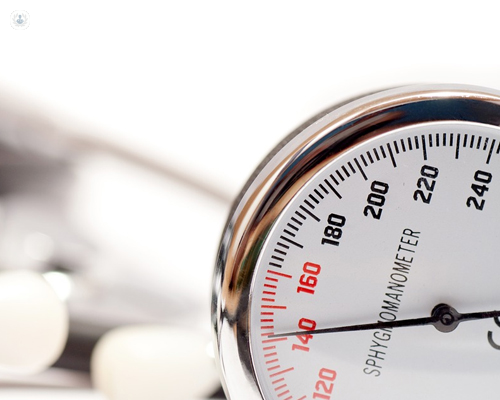hypertension
Written by:Blood pressure is the pressure that the heart needs to exert on the arteries so that they distribute the blood between the different organs of our body. The minimum or diastolic pressure is obtained every time the heart relaxes, the maximum or systolic pressure, every time the heart contracts. High blood pressure (HBP) occurs when blood pressure remains high in a sustained manner.

Blood pressure is considered normal when it is below 120/80 mm Hg and is considered HTA when it is above 140/90. On the other hand, voltage values ranging from 130-139 / 80-89 mm Hg are considered prehypertension, which make us more susceptible to hypertension.. Therefore, whether you are in the prehypertension phase or in hypertension, you should watch your diet and your weight to prevent the values from increasing.
Causes and types of hypertension
The blood pressure of our body can be affected by several factors. The most important are:
-The amount of fluid (blood) that circulates through our blood vessels. And that can be increased by the amount of sodium in the blood, the different hormones of the body or the state of our kidneys
-The diameter of our arteries, which narrows with age since the blood vessels become more rigid.
The HTA affects 35% of the Spanish population, to 68% when we talk about those over 60 years. In your case it may be secondary, that is, due to another disease (renal, cardiovascular or hormonal system problems) or; as in most cases, primary. Then the cause is unknown and it is not due to any other disease.
Symptoms and consequences
In most cases, hypertension usually does not have symptoms and is diagnosed when stress is measured for other reasons or in a routine health check. There are some people who suffer a sudden rise in tension, which is called malignant hypertension , and may have symptoms such as nausea, vomiting, severe headaches, blurred vision or confusion.
By having a higher pressure, the heart must make an overexertion which affects both the heart and arteries can create chest angina, arrhythmias, vision disorders, myocardial infarction or brain or kidney failure, among others.
Medical treatment
If you suffer from hypertension, medical treatment will consist of prescribing an antihypertensive medication and controlling your blood pressure regularly.. If your tension improves you should never stop taking your medication without consulting your doctor and it is also advisable to notify you when you are going to take any other medication, as in some cases, there are medications that can nullify the antihypertensive effect.
If you suffer from prehypertension there is usually no medication but it is advised to make some changes in lifestyle that will help us to prevent the tension from increasing, such as:
-Give up smoking.
-Do exercise frequently but moderately. Since extreme exercises can generate an increase in tension.
-Control your stress
Nutrition recommendations
-Reduce overweight and obesity
- Reduction of excessive alcohol consumption
- Carry out a heart-healthy diet
Therefore, it is recommended that not only focus on carrying out a diet low in salt but also a heart-healthy diet to prevent us from finishing other diseases that worsen the health of our circulatory system and increase our risk of suffering from cardiovascular disease.



